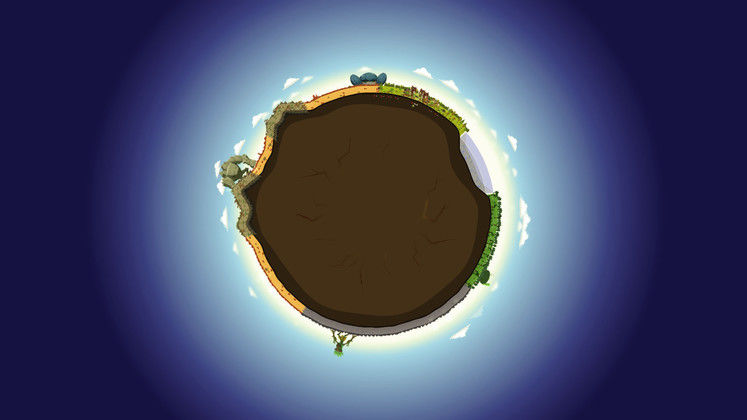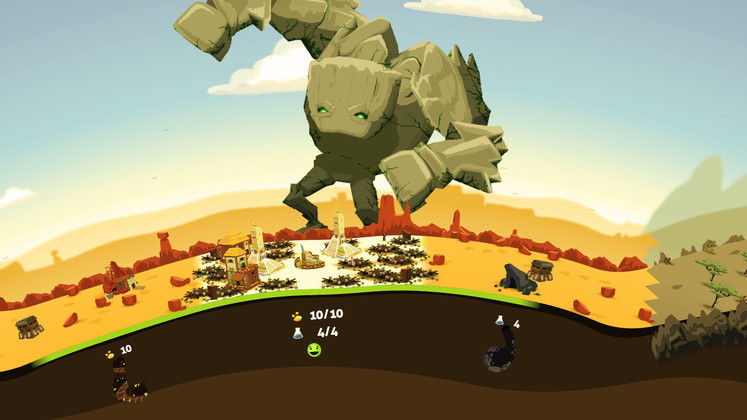As more villages spring up and your existing ones expand, you'll still have a handle on things, but then suddenly your villagers' minds will be filled with lofty dreams, and across every corner of the globe your village's will be yearning for the next big thing. They'll no longer be happy with a school, demanding instead a university, or a temple instead of a shrine. That's humankind for you - one small step on the moon and they're picturing themselves leaping to Mars. In Reus, it's your job to make these dreams - no matter how small or large - a reality, and bring prosperity to your world as a result.
 |
| It may not look like much, but it's home |
You play the role of God, looking down on a 2D, rotatable planet, but you've got far fewer than seven days to craft your world. In the first era, you only get 30 minutes to build up your village, eventually unlocking a mode that allows you to play for up to two hours at a time. Within this short period you have to raise a village (or many villages, as the case will likely be) from nothingness to bulging prosperity by accumulating resources, which are split into the three main categories of Wealth, Food, and Technology.
You won't be digging mines or growing trees yourself, though - deities don't like getting their hands dirty. Instead, four giants fall under your control, each one representing the different earthly elements of Ocean, Forrest, Desert, and Swamp. Each giant can turn the wasteland beneath you into their designated land, as well as populating each patch with plants, animals and minerals - these are what give you your resources, and where the game gets clever.
In Reus, there is such a thing as intelligent design. In order to maximise your output - something that you'll need to do in order to complete the advanced projects that your people wish to build - you'll need to take advantage of each plant or animal's evolutions and symbioses. By placing specific types of resources next to each other you can reap valuable bonuses - putting a chicken next to a blueberry boosts their food output for instance. Alternatively, you can use your Forrest giant to bestow a blueberry plant with a leaf aspect, allowing you to evolve it into a strawberry - a fruit which gives more bonuses and comes with its own symbiosis.
 |
| Some nomads will inexplicably choose to settle in a swamp |
It requires you to learn each animal, plants, or mineral's unique foibles, pairing them together to make sure your world is operating at maximum efficiently. In the early days, you'll get this wrong a lot, and find yourself having wasted valuable land with the wrong thing, causing you much grief in the later stages. However, as you master it, you soon learn to place resources in a strategic manner, making progress much simpler and allowing you much more control over which resources your village is producing.
The projects you're trying to build have their own micro-time limits alongside the overall one, and as they grow ever-more complicated, you always eventually hit the point where the micromanagement becomes too intense. You can take steps to counter this, mostly by destroying new villages that settle and just focusing on one or two. This is advantageous in that there's far less to keep an eye on, but it also makes it harder to raise those two villages to greatness as your giants will have less abilities available.
Completing projects nets you ambassadors, and each village type has its own unique type of ambassador. These privileged few literally sit upon the shoulders of giants, granting your world-crafting titans special abilities as they do so. You'll need each type of ambassador to unlock the full range of abilities for each individual giant, hence why sticking with just one or two villages becomes disadvantageous in the long-run, preventing you from fully upgrading each patch of earth with the aspects/upgrades available.
 |
| Reus won't judge you for going all Old Testament on a village (or three) |
As delightful and clever as Reus is, the intensity of the play when you find yourself juggling multiple projects unfortunately lets it down, as it doesn't feel built to support such action. It's not always clearly apparent just what evolving an animal will do, even when you've been through the trial-and-error before, and you've got to read every tool-tip carefully before making a decision. Not so bad at first, but troublesome when you're acting in a pinch. The giants are also lumbering masses, traversing the earth's surface at snail's pace, making it incredibly frustrating to keep two villages on opposite sides of your earth stocked with the right resources and upgrades.
REUS VERDICT
These issues aside, though, Reus is a fantastic god game - even if it departs from the usual defining staples of that genre and feels more like a puzzle game. Working out its puzzles to help bring your people to prosperity is challenging and rewarding, and while the need to keep referring to tooltips and the slow speed of your giants can get frustrating, you’ll want to keep returning to Reus, trying again and again to make your world as prosperous as it can be.
TOP GAME MOMENT
Agonisingly destroying village after village in order to fully focus on your ‘chosen people’.




